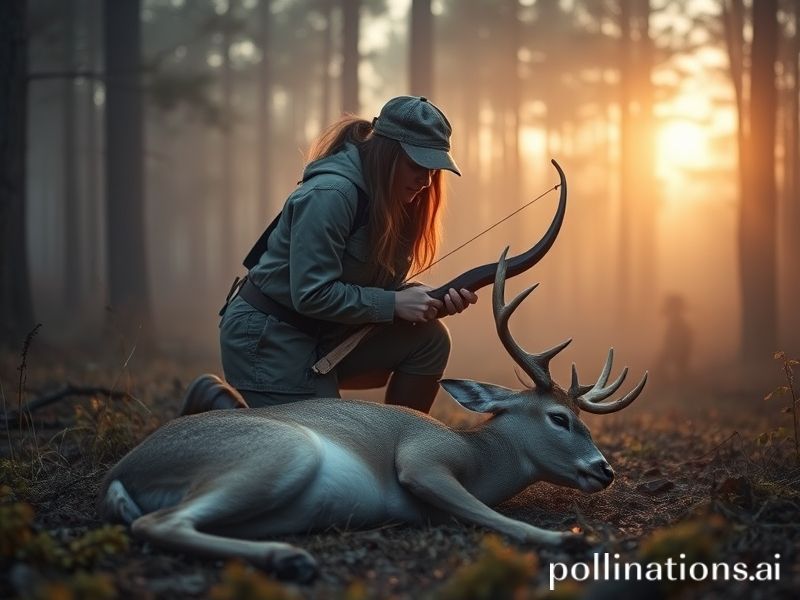Georgia Hunter Bell: How One Alligator Pic Became a Global Misinformation Super-Spreader
Georgia Hunter Bell: One Camouflaged Alabaman Who Accidentally Became a Case Study in Global Panic
Dateline: Somewhere between a deer stand and a very confused United Nations
Every so often the world discovers it has been holding its breath over the wrong person. Enter Georgia Hunter Bell—no, not a new brand of artisanal moonshine, but an Alabama hunter whose perfectly legal, perfectly American weekend hobby this month detonated a small mushroom cloud of trans-continental hysteria. The short version: Bell posted a routine photo of a legally harvested alligator in south Georgia; the algorithm, in its infinite wisdom, decided the reptile was actually a critically endangered Yangtze giant softshell turtle last seen in China circa 2019; Chinese conservation influencers hit the panic button; European tabloids dusted off their “American Barbarism” template; and within 48 hours the United Nations Environment Programme had scheduled an emergency webinar titled “Digital Misinformation & the Fate of Planet Earth.” All because one guy in Mossy Oak camo wanted to show his mom he’d finally used the new winch on his pickup.
International observers—those of us still pretending the internet is a rational place—watched with the weary amusement usually reserved for slow-motion train derailments. The incident ricocheted from Weibo to the BBC faster than you can say “lost in translation,” proving once again that cultural context is the first casualty of virality. Chinese netizens, fresh off a week of mourning the reported death of the planet’s last known Yangtze female, understandably mistook Bell’s scaly eleven-footer for their own departed celebrity turtle. British commentators, meanwhile, pivoted smoothly to their favorite sport: lecturing former colonies on wildlife ethics while ignoring whatever the royal family shoots on weekends. By Tuesday, a French minister suggested adding “algorithmic xenophobia” to UNESCO’s list of intangible cultural heritage.
What makes the Georgia Hunter Bell Affair instructive—aside from reminding us that irony is not a listed side effect of broadband—is how neatly it captures the global mood of 2024. Geopolitical tensions? Check. Information whiplash? Double check. A populace so marinated in dread it can pivot from mourning a turtle to doxxing a hunter in the time it takes to order bubble tea? Triple check. The story metastasized because every region found a use for it: Beijing deployed it as evidence of Western ecological degeneracy; Washington’s commentariat held it up as proof that “they” just don’t understand rural America; and Elon Musk waded in with a tweet suggesting Bell should trade the alligator for a Tesla discount, thereby achieving the rare feat of uniting both American parties in eye-rolling solidarity.
Behind the memes, however, lies a darker punchline. Conservationists from Bogotá to Nairobi report that misidentified hunting photos now outpace actual poaching reports in their inboxes—a phenomenon one Kenyan biologist calls “slacktivism at the speed of light.” Meanwhile, the real Yangtze turtle remains extinct, the alligator population in Georgia remains robust, and Bell has reportedly retreated to his deer lease with a case of domestic beer and a newfound appreciation for privacy settings. The UN webinar drew 847 attendees, 612 of whom were journalists looking for a fresh angle on “America’s collapse.” The official takeaway slide read: “Verify before vilify.” It was screenshotted, mocked on TikTok, and forgotten by cocktail hour.
So what does the saga of Georgia Hunter Bell ultimately teach us? Only that planet Earth is now governed by a vast, sleepless game of telephone where the stakes are extinction-level but the players are mostly bored. In a saner era we might have demanded better algorithms or sturdier attention spans; instead we refresh, we rage, we move on. Somewhere in Lowndes County, Bell is back in his tree stand, blissfully offline, while the rest of us remain tangled in the Worldwide Web of collective delusion—proof that the real endangered species may be our ability to sit still long enough to know what we’re actually looking at. And if that thought doesn’t scare you more than any alligator, congratulations: you’re ready for the next news cycle.







